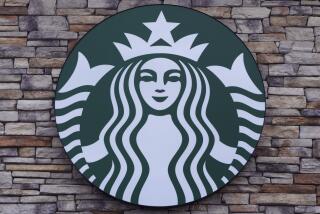Venezuelan Troops Reclaim Coca-Cola for the Masses
- Share via
CARACAS, Venezuela — National guard troops commandeered plants belonging to the local bottling affiliate of Coca-Cola and another beverage company in Venezuela on Friday, as President Hugo Chavez stepped up his battle against private companies he accuses of participating in a strike that has crippled the nation.
Minutes after he took over the Coca-Cola plant with a squad of soldiers toting machine guns, Gen. Luis Felipe Acosta grabbed a locally produced malt beverage from a warehouse pallet, downed it and belched loud and long as television news cameras rolled.
“All of this is going outside,” he said, waving his hand at the Coca-Cola and other canned drinks around him. “This is for the people.”
Chavez had previously warned food companies that they would be subject to takeover as the strike resulted in shortages, but Friday’s actions drew widespread condemnation.
By taking over Coca-Cola, Chavez also left himself open to accusations that he was aiming a blow at the United States. And although soda and beer have long been absent from grocery store shelves, so, too, have more basic products like flour.
“Coke isn’t part of the basic national market basket,” said Hermann Escarra, an anti-Chavez constitutional lawyer. “They have violated basic fundamental rights” in commandeering the plant.
The takeover of the plant belonging to Miami-based Panamco was only the second time that Chavez has taken over a private company during the country’s debilitating 47-day-old strike. Previously, he has ordered troops to seize trucking firms to transport oil.
Chavez also sent in national guard troops to take over a bottling plant belonging to the Polar Group, a holding company that produces beer as well as bottled water and flour.
Acosta accused both plants of hoarding products needed by citizens, and said the law allowed the seizures.
The day’s images juxtaposed the camouflage-clad foot soldiers of Chavez’s left-leaning revolution with the famous red-and-white icon of the Coca-Cola Co.
Acosta mounted the running board of the first Coca-Cola delivery truck to leave the plant, located in Valencia, an industrial town in northern Venezuela. He said he planned to store the soft drinks in battalion headquarters before distributing them in the streets.
The guardsmen didn’t say whether they were coming back to the plants targeted Friday but said they would go on to others.
The takeovers raised fears that the president would begin seizing other industries, including the country’s private media, which are openly anti-Chavez. On Friday, Chavez’s government filed suit against two national media companies, seeking fines against them for not broadcasting objective news.
U.S. Ambassador Charles Shapiro sharply criticized the plant seizures.
“This is an obstacle that disturbs relations,” he said. “It’s something I don’t understand.”
The takeovers Friday sends a clear message to foreign investors that their presence is unwelcome, which is likely to hasten the exodus of foreign funds and scare off future investment, according to William Reinsch, president of the National Foreign Trade Council, a Washington-based group whose members include the United States’ leading multinationals.
“This tells investors it’s not a stable country, not a stable economy, and if they’re smart, they should get out,” he said. “It’s just exactly the wrong signal.”
The seizures, done publicly with media cameras in tow and against two high-profile companies, were a clear warning to other businesses to give up the work stoppage, as well as a symbol of Chavez’s determination to break the strike, which has cost the country $4 billion so far.
Venezuela’s social conflict pits Chavez and his scattershot plans to better the lives of the country’s poor against a widespread opposition whose members believe that the effort is driving the country into the ground.
The strike, backed by unions, business groups, the media and dissident military officials, was launched Dec. 2 and seeks to force Chavez to hold early elections. His term doesn’t end until 2007. Chavez has said the opposition must wait until August, when the constitution permits a recall election.
The takeover of the Panamco and Polar plants was the latest blow against the opposition, which has become increasingly desperate and dispirited as Chavez manages to keep the country running even though the strike has nearly frozen oil production, the source of half the government’s budget.
Venezuela supplies about 15% of U.S. oil imports, normally exporting about 2.5 million barrels a day. Chavez has managed to export between 500,000 and 800,000 barrels of oil a day during the strike, and preserve minimum internal gasoline supplies.
Each company affected Friday is tied to a powerful Venezuelan clan. The Mendoza family, headed by tycoon Lorenzo Mendoza, 36, listed by Fortune Magazine as the fifth-richest under-40-year-old in the world, runs Polar Group.
The Cisneros family, headed by Gustavo Cisneros, Venezuela’s richest man, owns 6% of the shares of Panamco and controls nearly all the firm’s local sugar and packaging suppliers.
Panamco agreed in December to be bought out by Coca-Cola FEMSA, based in Mexico City, in a deal worth $3.6 billion, creating the second-largest Coca-Cola bottling company in the world.
In statements last week, Chavez accused Cisneros of plotting to overthrow his government.
“This fulfills a lot of his objectives,” said Janet Kelly, a professor at the Institute of Superior Studies of Administration, a Caracas business graduate school. “It’s a very aggressive move that shows you’re not giving up.”
Rodrigo Calderon, a Coca-Cola vice president for Latin America, said Friday that the Atlanta-based beverage giant was forced to stop producing its drinks in Venezuela in early December because of a shortage of raw materials and attacks on its delivery vehicles and personnel. He said Venezuela had become “dangerous for our personnel,” who had become a target of “different factions.”
Both Panamco and Polar have said they have been unable to distribute products because of safety problems and striking independent transporters.
But Calderon, who is based in Mexico City, said the company, working with the Food and Beverage Assn. of Venezuela, was still able to distribute some products to customers. He said the Venezuelan government confiscated the inventory of just one of nine plants in the country, equal to about one-quarter of a day’s supply for consumers. When asked why he thought Coca-Cola was targeted, he declined to comment.
Calderon said that the company would not be forced out of the country and that it plans to continue distributing its beverages on a “limited” basis in Venezuela “to the extent that we can without putting our employees into harm’s way.”
It was unclear what effect Chavez’s move would have on negotiations going on between the two sides of the strike, which received a boost this week with the creation of a so-called Group of Friends of Venezuela. Brazil, Chile, Mexico, Spain, Portugal and the United States all agreed to lend support to the talks.
In addition, Cisneros happens to be an acquaintance of former President Carter, who arrived this week for a planned fishing trip with Cisneros in Venezuela. Carter is scheduled to participate in the negotiations.
But Cesar Gaviria, president of the Organization of American States and the negotiations’ mediator, unilaterally suspended the talks Friday because of tension in the streets. Gaviria said talks would begin again Monday.
Outside the Coke plant in Valencia, protesters clad in Coca-Cola hats and shirts were arrested, tear-gassed and beaten by guardsmen. One woman was violently pushed to the ground after she grabbed a soldier. Two other women were shown on television being beaten with the flats of metal swords after they attacked another soldier.
The women’s treatment and Acosta’s belch seemed to awaken outrage in Venezuela, where, as in many Latin American countries, people have a certain attachment to chivalry and decorum.
Text messages flew from cellular phone to cellular phone decrying the belching, and commentators took to the airwaves as television played the scene over and over.
“It was grotesque and vulgar,” said Rafael Alonzo, the president of the food industry’s chamber of commerce.
*
Miller reported from Caracas and Iritani in Los Angeles. Special correspondent Stephen Ixer contributed to this report.
More to Read
Sign up for Essential California
The most important California stories and recommendations in your inbox every morning.
You may occasionally receive promotional content from the Los Angeles Times.













